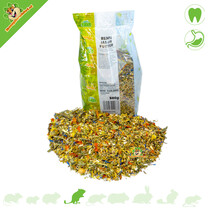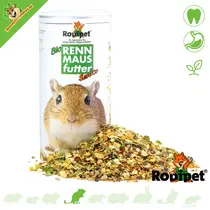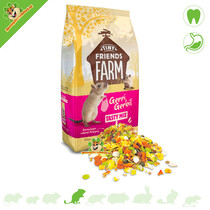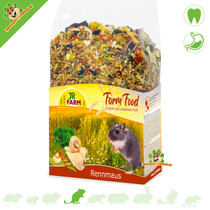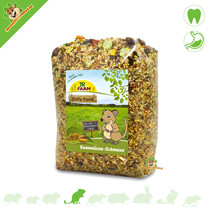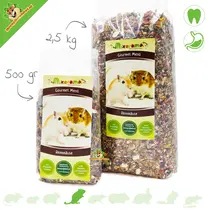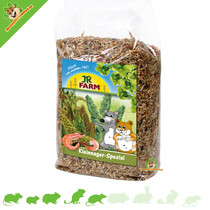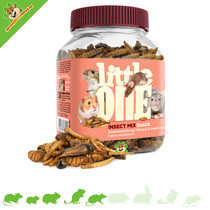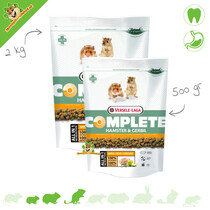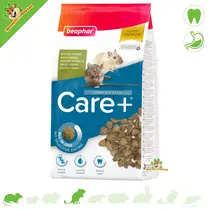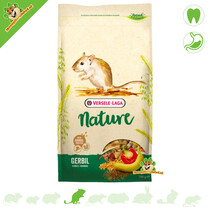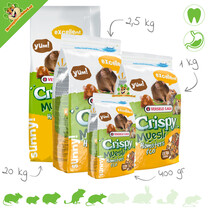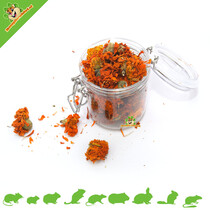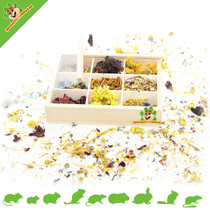Gerbil food – natural, balanced gerbil nutrition
Introducing our specially formulated forage menu, designed with love and care to offer your furry friend a tasty and balanced meal!
Read moreBunny Nature GerbilDroom Expert Gerbil Food - The Ultimate Nutrition for Your Cute Gerbils! Imagine a food source lovingly crafted for your furry friends, the gerbils! Bunny Nature GerbilDroom Expert Gerbil Food isn't just any food; it's a complete meal s
Read moreGerbils live in the arid and dry steppe and desert regions of Asia. These landscapes are characterized by sandy soil, grasses, wild herbs, shrubs, and only a few trees. In the wild, gerbils nibble on tender shoots of various herbs, flowers, and grasses. T
Read moreRodipet gerbil food is 100% natural and organic. Only the best local ingredients have been added to this wonderful blend. Thanks to numerous research trips to gerbil habitats, Rodipet has gained extensive knowledge about their diet. Gerbils are very energ
Read more- Voor 17 uur besteld, dezelfde dag verzonden!
- Specialist sinds 2011
- Delivery from our own stock
Mr. Crumble Natural Gerbil Food is a supplementary pet food specifically for gerbils. Natural food for gerbils, made with only premium natural ingredients. The ratio of flour to oilseeds is 70:30, just like in nature. The mix also contains small-grained f
Read moreLittle One Gerbil gerbil food contains the complete complex of proteins, fats, carbohydrates, vitamins, and minerals necessary for high-quality nutrition and health for your pet. The balanced content ensures high nutritional value and accessibility.
Read moreSupreme Gerri Gerbil is a complete gerbil food for gerbils of all ages. This gerbil mix is low in fat and rich in delicious ingredients that gerbils love. It doesn't contain sunflower seeds, as these aren't always healthy for gerbils.
Read moreJR Farm gerbil food meets the highest demands of gerbils. Discover natural gerbil food from JR Farm! This unique combination of a balanced, expertly developed complete food blend with over 35 different seeds and four high-quality animal protein sources br
Read more- Voor 17 uur besteld, dezelfde dag verzonden!
- Specialist sinds 2011
- Delivery from our own stock
JR Farm Gerbil Feast Gerbil Food is a real treat for gerbils. It's a natural, complete food mix suitable for all gerbils. This versatile premium mix with wild seeds and plenty of animal protein is specially developed for gerbils and is always eaten if an
Read moreThe Mixerama menu for gerbils is a complete pet food formulated for the special dietary needs of Mongolian gerbils. It's based on a grain mixture with a 70:30 ratio of flour and oilseeds. This food is supplemented with nuts, seeds, vegetable and animal pr
Read moreA feast for all-eating rodents! The JR Farm Rodent Protein Special is a protein-rich supplementary mixture for small rodents. With many different seeds and sources of animal proteins.
Read moreThe Little One Insect Mix is a delicious and above all very nutritious snack for all omnivorous rodents, such as: Mouse, Dwarf Hamster, Hamster, Gerbil and Rat. The mix is a valuable source of macro & micronutrients. Perfectly balanced and contains dr
Read more- Voor 17 uur besteld, dezelfde dag verzonden!
- Specialist sinds 2011
- Delivery from our own stock
Versele Laga Complete Hamster & Gerbil is worry-free nutrition. The exceptionally tasty All-in-1 pellets prevent selective eating, ensuring your hamster or gerbil receives all the essential nutrients and stays in excellent health. This food, with chicken
Read moreWitte Molen PUUR Mini-Hamster & Friends Dwarf Hamster Food is a pure and varied gourmet muesli for Dwarf Hamsters (Roborovski Dwarf Hamsters, Russian Dwarf Hamsters, Campbell's Dwarf Hamsters, Chinese Dwarf Hamsters), Gerbils (Fat-Tailed Gerbils), and Mic
Read moreBeaphar Care+ Mouse and Gerbil Food is a complete food for mice and gerbils. Care+ Mouse/Gerbil Food is an extruded, super-premium gerbil food. Each kibble has the same composition (All-in-One), resulting in no selective eating. The hard kibble supports d
Read moreVersele Laga Nature Gerbil Food contains mealworms as animal protein for a balanced diet for gerbils. The fruit and vegetable composition adds variety and provides all the essential vitamins to the daily menu. Extra grains provide energy and vitality for
Read more- Voor 17 uur besteld, dezelfde dag verzonden!
- Specialist sinds 2011
- Delivery from our own stock
Versele-Laga Crispy Muesli Hamsters & Co is a versatile rodent food suitable for several small rodents. Thanks to its varied composition, this complete food offers everything your small rodent needs to thrive.
Read moreWitte Molen Expert Hamsters & Friends – Budget-friendly Food for Hamsters and Small Omnivorous Rodents! Take good care of your hamster and other small omnivores with Witte Molen Expert Hamsters & Friends! This tasty and versatile mixture combines a mix of
Read moreNice preserving jar to store food, herbs, flowers or snacks in! Airtight and hygienic storage is very pleasant. The preserving jar is made of plastic, which also makes it less breakable. The closure is very good. The jar closes really well!
Read moreThis nice food and snack jar is ideal for storing dry food or rodent snacks. The pot is made of plastic and can be closed airtight. This keeps the contents fresh and protects against moisture. In addition, the pot is also dishwasher safe.
Read more- Voor 17 uur besteld, dezelfde dag verzonden!
- Specialist sinds 2011
- Delivery from our own stock
Organize and Present Your Snacks in Style with the Luxury Small Wooden Storage Box! A touch of elegance and practical organization come together in our Luxury Small Wooden Storage Chest. This beautiful storage box, made from untreated bare wood and equipp
Read more
Gerbil food – natural nutrition for gerbils, with selection aids for basic food and enrichment
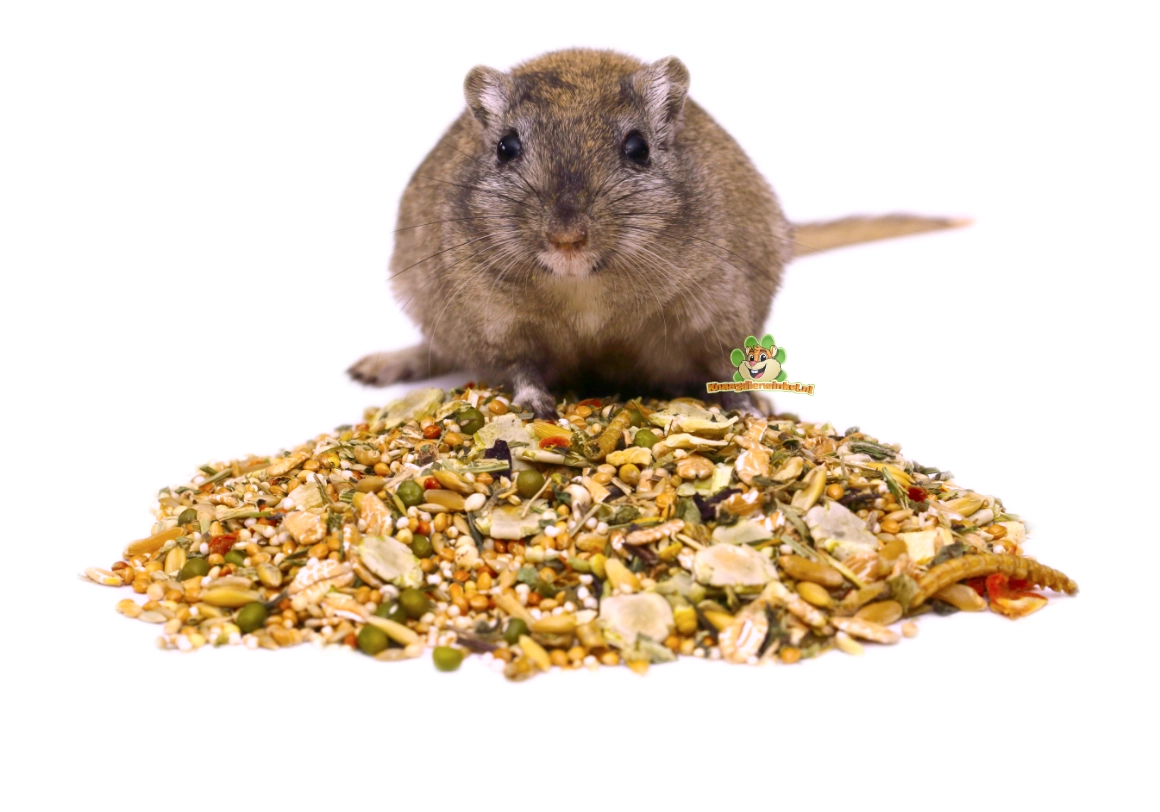 Good gerbil food reflects gerbils' natural habits: selecting , peeling , and building a small supply . In this category, you'll find foods with a logical base of seeds and grains , supplemented with options for variety and foraging . This keeps the food practical, organized, and suitable for gerbils who are active and like to stay busy.
Good gerbil food reflects gerbils' natural habits: selecting , peeling , and building a small supply . In this category, you'll find foods with a logical base of seeds and grains , supplemented with options for variety and foraging . This keeps the food practical, organized, and suitable for gerbils who are active and like to stay busy.
At DRD Rodent Shop® , we select gerbil food based on its practicality: clear composition, suitable for daily feeding, and cleverly combined with enrichment. Specialists in rodents and rabbits since 2011 .
Start with one clear main mix and keep it varied. This makes feeding consistent and clear.
View selection aid →
Sprinkle (part of) the portion, use food puzzles or hide small amounts for additional search behaviour.
Play & Forage →
Gerbils often drink little, but fresh water should always be available (roast-proof or protected).
Drinking bottles & water bowls →
Gerbil food in this category – quick selection guide
Gerbils are true foragers: they love to select, peel, and store food. So choose a seed-rich base and use variety primarily for enrichment. Not sure? Since 2011, we've been selecting food based on its suitability for rodent lovers who want a little more than the "standard."
1) Daily basic food (main mix)
- Bunny Nature Gerbildroom Expert (500 g) – premium base for gerbils.
- Gerbil Basic Menu (500 g) – clear, daily basis.
- Natural Gerbil Food (500 g) – natural approach, suitable as a daily basis.
- Farm Food Gerbil (500 g) – seed/grain mix as a basis.
- Little One gerbil food – accessible basic option.
- Supreme Gerri Gerbil (850 g) – larger package, practical for a regular routine.
- JR Farm Gerbill Feast (600 g) – varied mix for daily feeding.
- Beaphar Care+ Mouse/Gerbil (700 g) – handy if you are looking for one food that is also intended for mice/gerbils.
2) Variety & foraging (for sniffing and active feeding)
- Foraging menu – ideal for scattering (small portions) and encouraging foraging behaviour.
- Complete Hamster & Gerbil – practical as a combination food (use with portion control).
- Witte Molen Puur Mini Hamster Friends (400 g) – also used by hamster/gerbil enthusiasts; always check what your gerbils select.
- Versele-Laga Crispy Muesli Hamsters & Co – more “muesli-style”; offer it as a variation and keep the basic food leading.
3) Protein & insects (supplement, not main food)
- JR Farm Rodent Protein Special (600 g) – for responsible supplementary feeding in addition to the basic mix.
- Little One Insect Mix – handy protein variation (small and measured).
✔ Tip for beginners: choose one staple food, gradually increase the intake, and introduce variety in small steps. Gerbils hoard, so don't just assess the food bowl, but also the storage areas in the enclosure.
What is gerbil food?
Gerbil food is the daily diet that provides your gerbils with energy and nutrients. In practice, it usually involves a mix of seeds and grains, supplemented with suitable ingredients for variety. The goal is a food that gerbils can easily digest and that matches their natural behavior (selecting, peeling, and hoarding).
What should you look for in good gerbil food?
- Basis = seeds & grains as the main component, suitable for active gerbils.
- Limited “snack feeling” : food that is too sweet or too fatty usually does not fit as well into a daily routine.
- Variation with care : extras (such as insects) are supplementary, not the main role.
- Feeding behavior : Gerbils select and stockpile food; therefore, also check stockpiles.
How much food do you give per day?
As a practical guideline, you can start with a small daily portion and adjust based on activity, age, and body condition. Many adult gerbils eat an average of a few grams of dry food per day. More important than an exact number: avoid consistent leftovers (especially with muesli-like mixes) and monitor what is actually being eaten.
Water should always be available. Gerbils often drink little, but fresh, clean drinking water should always be available.
Smart combination with hay, herbs & enrichment
- Hay, herbs & seeds – for variety and a fun browsing experience.
- Gerbil snacks – only supplementary and in moderation.
- Play & forage – make eating an activity.
Checklist – feeding gerbil food practically and responsibly
✔ Choose one basic food and keep variation supplementary.
✔ Make feeding active (sprinkles, hiding, food puzzles).
✔ Also check stockpiles (hoarding is normal).
✔ Fresh water always available.
✔ If you have any doubts about appetite, behaviour or stool, consult a veterinarian.
Safety
Introduce new foods slowly and gradually. Monitor your gerbils' continued normal eating and activity levels. If you notice any significant changes in appetite, stool, or behavior, contact a veterinarian.
FAQ – gerbil food
What is the best gerbil food?
The best gerbil food is a seed-rich base mix that suits their active behavior, with variety as a supplement. Choose one main mix and don't change it too often, so you can properly assess what they're actually eating.
Why do my gerbils seem to be "eating very little"?
Gerbils hoard food. They often store food in tunnels or in a house. Therefore, check storage areas as well, not just the food bowl.
Are insects necessary?
Insects and protein supplements are intended as a treat or variation. Use them in moderation and keep the base feed in the lead.
✔ Gerbil food with selection guide for basic and varied diets
✔ Active feeding through foraging and hiding
✔ Specialist since 2011
Order before 5 PM, shipped the same day | Delivered from our own stock | Specialist since 2011





